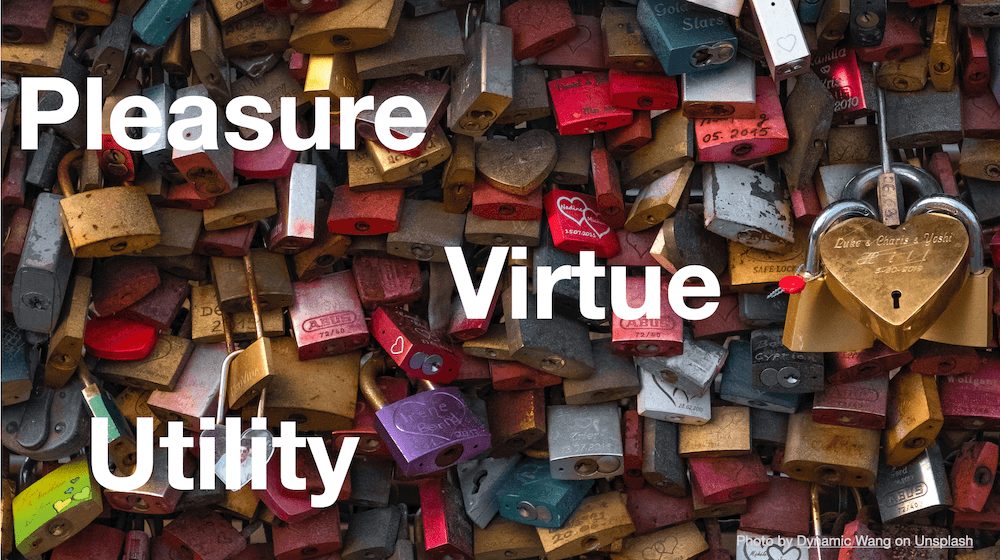How important is friendship for you? How strong are your relationships? These are two questions that have always been important but seem to be taking up a renewed and vital importance in a world of epidemic loneliness, acute mental health issues and a difficult work environment. The question becomes:
How to develop stronger friendships and relationships, whether personally or professionally?
In the eighth book of Nicomachean Ethics, Aristotle identified three types of or motives for friendship: of pleasure [Ευδαιμονία] (or Hedonistic), of utility [χρήσιμο] (or Transactional), and of virtue [Αρετή]. According to Aristotle (and a few others), humans are, at their essence, social beings and friendship is the highest expression of this truth. Friendship is actually vital to our existence.
Moving toward trust
Putting it prosaically, Aristotle’s description of the three forms of friendship boils down to an exchange or an equation. With each, there is an opportunity for complicity and to create a bond. In creating a bond, there is the development of trust. In Pleasure, having fun is essentially a primal instinct, where emotions are shared. We laugh at the same jokes, we play the same games. In Utility, being useful to one another, the mutuality is predominantly rational. A tit for tat, where we take the measure of each exchange, each transaction. Did the other person give a fair exchange in return? In Virtue, meanwhile, we have moved into hope, imagination and (non-religious) faith. This relationship occupies the prefrontal cortex. They engage the emotions and encourage adherence where the faith and trust becomes mutual and lies at a deeper level.
| Form of relationship | positives | negatives |
| Pleasure | fun, play, sense of humor, shared laughter… | gone once the grin is wiped off |
| Utility | equity, exchange, rationality | dissipates if sense of equity is unbalanced |
| Virtue | moral high ground, give before expecting in return, karma | risk being taken advantage of… |
While we’ve been talking about friendships above, it’s fair to expand the concept to relationships between individuals. As such, it’s an interesting framework for looking at how professional relationships — even Customer Relationship Management (CRM) — can be analyzed and improved. While the notion of virtue (with high moral standards) stands out as the most attractive qualification, there are positive aspects to each form of relationship. For instance, for many brands, being genuinely useful is already an upgrade. As Jay Baer (author of the great book, Youtility) wrote, providing utility for your customers is a powerful form of marketing. Ultimately, though, relationships based only on pleasure or utility are less stable and are thus more subject to breakdown over time.
The business relationship
Just as philosophers might debate that there is no such thing as pure altruism, there’s always some kind of exchange. Putting aside conflictual or toxic relationships, some associations are constrained by a zero sum game mentality, run on a one-dimensional level. In others, it is more or less easy to find ways for everyone to gain from the exchange, especially when the perceived benefits are different, e.g. barter agreements. The key is finding out more about what is of interest to the other side. In a conflictual negotiation, parties are reluctant to release any information; so if there’s bad blood already, the path to restoring trust is typically longer. That said, if your relationship has never traversed challenge, it’s likely on shallower grounds.
In a world where we are more quickly marked by the negative outcomes (we remember more readily the harsh criticism than the flourishing compliments), we have in each relationship an option whether to build it into a longer term affair or purposefully seek a one-time transaction. In the former, the currency is trust. In the latter, the limitation is time and the nature of the deal.
Building stronger relationships
An example that showcases the road to building stronger business relationships comes from my experience while working at L’Oréal in the USA. Specifically, in the area of professional salon products, we would sell professional brands to hairdresser salons through distributors.* The constant management refrain was all about creating “partnerships” with these distributors, which were independently owned companies selling many competitive lines. But in the vast majority of the relationships, it was at best transactional. I have three important take-aways. The first point was that saying what you intend is worthless. Actions speak far more than words.
Aim higher

Photo by Woody Kelly on Unsplash
The second point is that if you aim for “partnership,” you will likely end up merely with a basic supplier relationship, which at best is transactional and, at worst, deeply mistrusting and conflictual. What my great friend and mentor, Pat Parenty, taught me is that if you consider your distributor as a customer — not just as a channel through which to sell your products — you can forge a stronger form of partnership.
There’s a continuum:
SUPPLIER <—> PARTNER <—> CUSTOMER
As Pat would reiterate, it’s not about being subservient. It’s about give and take (in that order). It’s about being fair in a way that deeply understands the distributor’s perspective. Having empathy is a pre- condition for creating such a strong partnership.
The last point is that, when looking to develop your relationships, in a professional space, the history and context count. When I moved to Canada to run the Professional Products Division, I learned the hard way. Despite my best intentions, I represented a company that had a long history with its distributors. Not only that, but they knew that one day I would move on and after me would be somebody else, also a L’Oréal representative. Thus, I was just a link in a longer chain. In developing your relationship with third parties and customers, you need to be aware of the history that precedes you. Know that it’ll be written on your forehead (or your back) by them.
Leading from the top
When it comes to developing your relationships at work, it would be interesting to re-categorize your customers and partners along the three lines. It could even be intriguing to do the same for intra-company employee relationships. One thing is for sure, the way you, as a leader, behave and how you consider your relationships — notwithstanding your high title — will help drive the best culture and ambiance in the workplace as well as how your teams interact with and ‘bond’ with your stakeholders. It takes intentionality in order to foster such relationships. You’ll need to be honest with yourself and your true intentions. If you trust yourself, you are more likely to gain the trust of others. As with love, if you love yourself, you’ll be better able to love others.
In sum, being virtuous isn’t always the aim. This is not a saintly call for us all to turn into philanthropists and altruists. There are plenty of relationships where pleasure and utility are absolutely fine. But, for the important long-term people, you should intentionally be looking to achieve a more virtuous relationship.
Your thoughts?
*L’Oréal USA eventually bought a national distributorship network and brought it in-house in order to have better control of its sales channel. To my reading, this signalled an ability to create true partnerships. Without the ability to create a virtuous relationship, the decision to own the sales channel may well have been warranted. I’m not privy to the ongoing financials or performance, but as with any strategic decision, execution is key. Personally, I felt that by having different distribution networks for each brand was vital to foster brand differentiation. But that’s a tale of another post!











